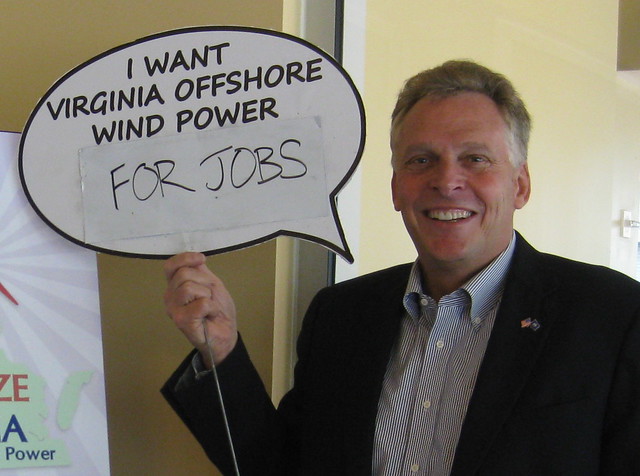 I received the following press release a little while ago and thought it was well worth passing along. On a related note, I just finished reading Virginia Climate Fever, which makes abundantly clear what's at stake for Virginia if we don't take strong action ASAP.
I received the following press release a little while ago and thought it was well worth passing along. On a related note, I just finished reading Virginia Climate Fever, which makes abundantly clear what's at stake for Virginia if we don't take strong action ASAP.
Richmond, VA – Today, 15 climate scientists from top universities across the Commonwealth are urging Governor Terry McAuliffe to address climate change impacts on Virginia’s economy and health by meeting the carbon reduction targets under the Environmental Protection Agency’s Clean Power Plan. The scientists, who have offered to meet with the Governor, also write that reducing fossil fuels combined with energy efficiency would create jobs, diversify Virginia’s energy supply and revitalize the state’s flagging economy. In addition, Virginia’s efficiency and renewables goals alone, if achieved, would satisfy the Commonwealth’s obligation under EPA’s Clean Power Plan.
"Surveys show that most people in Virginia correctly understand that climate change is happening, and that it is already causing our weather to become more extreme," said Dr. Edward Maibach, Director of the Center for Climate Change Communication at George Mason University. "They are beginning to understand that climate change isn't just a problem for people in the future, it is our problem, here and now, and we need to make good decisions about how best to deal with it."
Projections in recent reports by the United Nations Intergovernmental Panel on Climate Change earlier this month and the National Climate Assessment in May have starkly laid out how humans are driving climate change and what’s at stake for Virginia and the United States as a whole if we do not reduce carbon pollution. Both reports show that Virginia communities face flooding, particularly in areas such as Newport News, from rising sea levels, more extreme weather events, ocean acidification coupled with periods of drought and heavy rain.
“The changes are happening here and now—sea level rising, hotter and drier weather for longer periods of time, intense rainfall events—that trend will continue and increase and it demands action,” said Dr. James L. Kinter III, Director of the Center for Ocean-Land-Atmosphere Studies and Professor of Climate Dynamics at George Mason University. “We look forward to being a resource for Governor McAuliffe and the Commonwealth in developing strategies to address the threats climate change represents to our society, our health and our economy.”
Please see letter below.
Governor Terry McAuliffe
1111 East Broad StreetRichmond, VA 23219
Dear Governor McAuliffe,
We, the undersigned scientists and academicians of Virginia, representing a broad range of disciplines, write this letter to convey the importance of addressing climate change, fully utilizing the tools at your administration’s disposal in your single term. One of these tools is the EPA’s Clean Power Plan.
As you know, humans are negatively affecting the climate in the United States and worldwide. This fact was just reaffirmed by the UN IPCC Synthesis Report on November 2, 2014. The impacts in Virginia include rising sea levels (perhaps three feet or more by 2100), ocean acidification that adversely affects fisheries, increases in the heaviest rainfalls, more weather extremes, more frequent and severe droughts, and potentially more intense hurricanes and intensified tornado patterns.
These expected changes will impact our state. With its diverse economy and proximity to the coast, Virginia is particularly vulnerable. The changing climate will also affect human health. Heat-stress is a danger to humans that leads to increases in cardiac arrests and lowered worker productivity. Increased temperatures also threaten the respiratory health of Virginians by increasing ground-level pollution and allergens. Increased frequent flooding impacts building structures and degrades indoor air quality through enhanced mold growth. Finally, our warming climate presents added risks to vector-borne diseases and water-borne illness. Simply put, Virginia’s economy and residents are vulnerable to climate change.
But with peril comes opportunity: by reducing greenhouse gas emissions, you can create jobs, diversify our energy supply and revitalize our state’s flagging economy.
Embracing the targets for emissions reductions in the EPA’s Clean Power Plan is a great opportunity for you to accomplish this in your single term, particularly if cleaning up energy production is combined with reducing energy consumption through more efficiency. Indeed, transforming the state’s economy while also being a national leader in clean energy and energy-efficient technology is already within reach: the state’s efficiency and renewables goals alone, if achieved, would satisfy the State’s obligation under the proposed rule.
We offer ourselves and our expertise to your office. The undersigned are able and willing to meet with you – to provide current and accurate information so that informed decisions can be made. Only with accurate information can your office, and the Commonwealth, chart a wise path in the coming years and decades.
We call on you to embrace this opportunity to reduce greenhouse gas emissions, create jobs, diversify our energy supply, increase our energy efficiency and revitalize our state's flagging economy.
With Regards,
Dr. Andres Clarens, University of Virginia
Dr. Steve Cox, Virginia Tech
Dr. Howard Epstein, University of Virginia
Dr. Purusottam Jena, Virginia Commonwealth University
Dr. William Keene, University of Virginia
Dr. Jim Kinter, George Mason University
Dr. Deborah Lawrence, University of Virginia
Dr. John Little, Virginia Tech
Dr. Garrick Louis, University of Virginia
Dr. Thomas Lovejoy, George Mason University
Dr. Ed Maibach, George Mason University
Dr. Linsey Marr, Virginia Tech
Dr. Karen McGlathery, University of Virginia
Dr. Jennie Moody, University of Virginia
Dr. Hans-Peter Plag, Old Dominion University



 Sign up for the Blue Virginia weekly newsletter
Sign up for the Blue Virginia weekly newsletter








